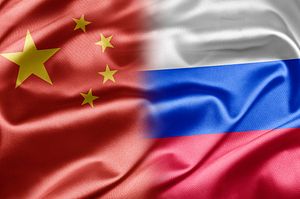Chinese President Xi Jinping arrived in Sochi today, where he will attend tomorrow’s opening ceremony for the 2014 Winter Olympics. While in Sochi, Xi met with Russian President Vladimir Putin. The Chinese-language Xinhua report on their meeting contained no specifics, but many effusive expressions of cordiality. Xi called Russia a “good neighbor, good partner, and good friend.” He equated his visit to Russia for the Sochi Olympics to congratulating a neighbor on a happy occasion. Putin agreed that in coming to Russia, Xi was coming “to see a good friend.”
Chinese media reported on the trip as a sign of strong cooperation between China and Russia. An article from Xinhua, reposted on the People’s Daily website, noted that both in 2013 and 2014, Xi chose Russia for his first overseas trips. “That serves as a potent proof of the special bond between the two nations,” the article said. That “special bond” has been on display since Xi Jinping assumed power in 2013 — since then, he has visited Russia three times and had half a dozen meetings with Putin.
An October 2013 Xinhua editorial said that China-Russia relations have “grown into a paragon of major-country relations on today’s world stage. It is distinguished for high mutual trust, fruitful bilateral cooperation, and deep sentimental attachment between the two nations.” There’s an implicit critique there of China’s relationship with the United States, which is all-too-often characterized by a lack of trust, divergent interests, and unfriendly public opinion. The article also said that China and Russia consider each other their “most important strategic partner,” unofficially demoting China-U.S. relations. China seems to have decided warming ties with Russia can serve as a useful counterweight to an increasingly wary relationship with the United States.
Accordingly, the major value of Xi’s trip to Sochi was symbolic. The Global Times in particular noted that Xi’s presence could serve as something of an antidote to an outpouring of negative reports in Western media. “China is an influential power,” the Global Times wrote, and so Xi’s attendance at the opening ceremony “amid the negative comments” sends a strong message of support. Once again, China and Russia are closing ranks to weather Western criticisms.
The Xinhua article reposted by People’s Daily explored in more detail the expected focuses of China and Russia’s partnership. The first item noted was “close contact and coordination on major international and regional issues, such as the Syria crisis and the Iran nuclear issue.” For the past few years, China and Russia have been more closely aligning their voices, particularly in the United Nations Security Council. While their interests do not exactly align on Syria, Iran, or other global issues, both China and Russia see the value in standing together to block unwelcome proposals by the U.S.-led block of Western nations.
The Xinhua article also noted that China and Russia will “strengthen their practical cooperation in [the] economy.” One of the vague goals for the Xi-Putin meeting this week was to advance cooperation on “large and practical projects,” which, as expected, included further progress on energy cooperation. Russian oil company Rosneft recently signed an agreement to provide 100 million tons of crude oil to China. On Thursday, according to Reuters, Rosneft announced that it will provide an additional 9 million tons of oil this year. China has now become the largest exporter of Russian oil, surpassing Germany.
































